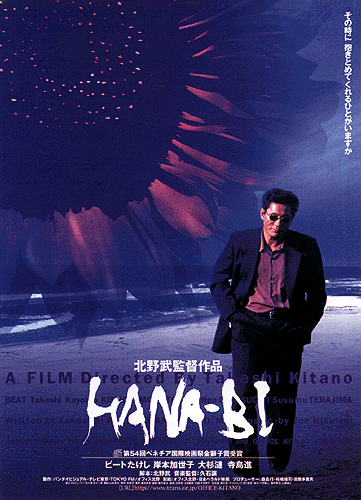
Hana-bi (Fireworks) (1997)
Directed by Takeshi Kitano
Starring Beat Takeshi, Ren Osugi, Kayoko Kishimoto
Nishi (Takeshi), a rogue cop, asks his partner Horibe (Ren Osugi) to
cover for him on a stakeout so he can visit his wife in the hospital.
During the stakeout, Horibe is shot, sustaining a career-ending wound.
Nishi joins the remaining members of the stakeout team and they corner
the shooter in a shopping mall. A shootout ensues and several of
the cops are killed. Nishi then shoots the killer, an act which presumably
leads to his dismissal from the force (the film is not organized in a linear
fashion and several plot points are never addressed, more on this later).
With his partner in a wheelchair, his wife slowly dying of cancer and the
deaths of his comrades hanging over his head, Nishi decides to rob a bank
to pay off the yakuza who have been lending him money. The robbery
goes well and the gangsters get their money, but not as much as they'd
like. With the remaining money, Nishi takes his wife on a final trip
before she dies. I think Hana-bi is the best film of the 90s and
is one of my all-time favorites. Kitano has crafted a tale that on
the surface appears to be nothing more than a violent gangster film.
There is certainly plenty of violence to go around: brutal beatings, the
deaths of the police officers, etc. (but keep in mind that Kitano is not
John Woo, the violence in Hana-bi is sparse but intense). Below this
facade of gangsters and violence, however, lies a touching, romantic love
story. Kayoko Kishimoto's performance as Miyuki, Nishi's wife, is
flawless. Without hardly any dialogue at all, she is able to communicate
the pain and hope of her character. The scenes between Nishi and
his wife are some of the most interesting and complex of the film.
In one scene, Nishi and Miyuki sit down to have a dessert. Nishi
prepares his wife's plate and then his own. Miyuki looks at her plate,
then his, and proceeds to take Nishi's dessert too. Another priceless
scene comes when the pair are on their trip, camped alongside the road.
Miyuki is holding up cards, showing Nishi only the backs. Nishi then
guesses correctly what the card is. Miyuki is amazed until she realizes
that Nishi can see the card in the rear-view mirror of their van.
These intimate scenes show us a side of Nishi that is in complete contrast
to the wrath he visits on anyone who opposes him. Nishi is an utterly
barbaric man trapped in a barbaric world. The only protest to this
barbarity that he is able to mount is the kindness he shows his wife and
friends...a kindness that redeems him in the end. Kitano's choice
to use a non-linear narrative is very effective for the type of film Kitano
creates, a film where the plot is secondary to the characters and their
interactions with their  environment.
Kitano's films are concerned not with the big picture but with the littlest
detail of everyday life. His shots linger on objects with little
apparent value to the narrative while he omits crucial scenes entirely
(for instance, we never do get to see when Nishi is fired; in one scene
he is a cop, in the next he isn't). This style is most plainly seen
in Kitano's Sonatine but is also present in this film as well. In
this review, I have neglected to give any attention to Ren Osugi's delightful
performance as Horibe and to the important yakuza subplot but these are
just as well thought out and perfectly executed as the rest of the film.
If Hana-bi is by chance still playing in your area, please see it.
Hana-bi is Kitano's crowning achievement to a stunning body of work.
environment.
Kitano's films are concerned not with the big picture but with the littlest
detail of everyday life. His shots linger on objects with little
apparent value to the narrative while he omits crucial scenes entirely
(for instance, we never do get to see when Nishi is fired; in one scene
he is a cop, in the next he isn't). This style is most plainly seen
in Kitano's Sonatine but is also present in this film as well. In
this review, I have neglected to give any attention to Ren Osugi's delightful
performance as Horibe and to the important yakuza subplot but these are
just as well thought out and perfectly executed as the rest of the film.
If Hana-bi is by chance still playing in your area, please see it.
Hana-bi is Kitano's crowning achievement to a stunning body of work.
Tim
 environment.
Kitano's films are concerned not with the big picture but with the littlest
detail of everyday life. His shots linger on objects with little
apparent value to the narrative while he omits crucial scenes entirely
(for instance, we never do get to see when Nishi is fired; in one scene
he is a cop, in the next he isn't). This style is most plainly seen
in Kitano's Sonatine but is also present in this film as well. In
this review, I have neglected to give any attention to Ren Osugi's delightful
performance as Horibe and to the important yakuza subplot but these are
just as well thought out and perfectly executed as the rest of the film.
If Hana-bi is by chance still playing in your area, please see it.
Hana-bi is Kitano's crowning achievement to a stunning body of work.
environment.
Kitano's films are concerned not with the big picture but with the littlest
detail of everyday life. His shots linger on objects with little
apparent value to the narrative while he omits crucial scenes entirely
(for instance, we never do get to see when Nishi is fired; in one scene
he is a cop, in the next he isn't). This style is most plainly seen
in Kitano's Sonatine but is also present in this film as well. In
this review, I have neglected to give any attention to Ren Osugi's delightful
performance as Horibe and to the important yakuza subplot but these are
just as well thought out and perfectly executed as the rest of the film.
If Hana-bi is by chance still playing in your area, please see it.
Hana-bi is Kitano's crowning achievement to a stunning body of work.
